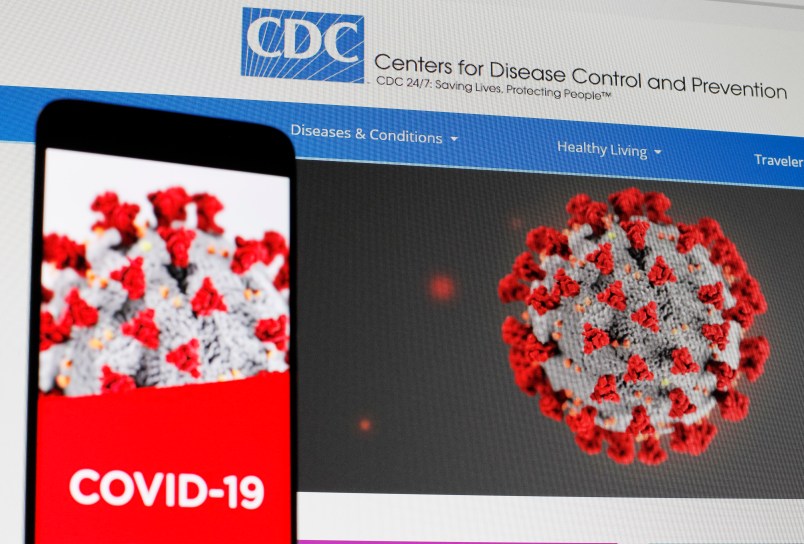From a gleeful “yippee!!!” to a pained reminder that his reputation is on the line, a Trump administration official’s failures and successes to influence the CDC’s COVID-19 reporting is captured in a new document dump from the House Subcommittee on the Coronavirus Crisis.
Paul Alexander, formerly a top deputy to Health and Human Services assistant secretary for public affairs Michael Caputo, the longtime Trump hype man and HHS official, is the star of the tranche of emails.
The communications show his fixation on the CDC’s COVID-19 reports, often complaining that they were purposely written to cast the administration in a negative light.
“Very misleading by CDC and shame on them,” he wrote in an August 2020 email to Caputo, former CDC Director Robert Redfield and a handful of other officials about a report on COVID-19 spread at a Georgia summer camp. “Their aim is clear. This hurts any President or administration.”
Alexander had, previously to his appointment in the Trump administration, worked as a part-time assistant health professor at McMaster University in Canada and at the D.C.-based Infectious Diseases Society of America. He has a PhD in health research.
While part of the administration, he displayed antagonism towards others in his field.
“If you wish to debate me, show me the data that refutes what I write below…not what tv tells you, show me the data, not what Fauci tells you, show me the data; Dr. Fauci has no data, no science to back up what he is saying on school re-open, none…he is scaring the nation wrongfully,” he wrote in an email to Caputo and many other officials.
Anthony Fauci, director of the National Institute of Allergy and Infectious Diseases, became persona non grata in the Trump administration for his refusal to play along with the President’s downplaying of the pandemic. He is now also serving as chief medical advisor to President Joe Biden.
Alexander shot around reams of articles to prove his primary argument, that schools should be fully reopened, and expressed his willingness to pen op-eds or do interviews to make the case.
He also repeatedly demanded complete oversight of the CDC’s COVID-19 reports before publication, griping that he was only getting to see summaries. Rep. Jim Clyburn (D-GA), chairman of the House subcommittee, noted in an accompanying release that former HHS Secretary Alex Azar had testified last fall that Alexander had no “authority over determining the final publication of” the CDC reports.
When Alexander succeeded in battering CDC officials into submission, even if the victory took the form of a minor tweak in language, he celebrated.
“Small victory but a victory nonetheless and yipee!!!” he crowed in an email to Caputo about the Georgia summer camp report in September 2020.
“Maybe you are having a huge impact and this is tremendous. Well done!” he exclaimed to then-CDC Acting Chief of Staff Nina Witkofsky in August 2020 about two “positive” CDC reports in a row.
But such success had a cost — his efforts became the subject of articles in the Washington Post and other outlets — and Alexander expressed the toll it was taking in an email to Caputo.
“I close by stating that the recent media reports based on leaks of our internal private discussions have been painful given the media is leaking one word or a line and not the full discussion,” he wrote in September 2020. “This is unfair and my reputation is at stake and I am being maligned with simple lines leaked and taken out of context.”
Both men left the department days later.
Clyburn demanded in a letter accompanying the documents that Alexander submit all records and communications, as well as sit for a transcribed interview by the end of the month. Clyburn sent letters to Scott Atlas, former special advisor to the President, and Steven Hatfill, former advisor to assistant to the President Peter Navarro, requesting documents and interviews as well.
“In emails to other political appointees, you bragged that CDC reports showed more ‘good news’ about the pandemic following your intervention, stating, ‘small victory but a victory nonetheless and yippee!!!’” Clyburn wrote to Alexander. “You also made extensive use of a private email account in connection with your work for the Department of Health and Human Services.”
Alexander’s interference, and attempts at interference, have been well-documented by emails sporadically released by the committee, oftentimes in exchanges with Caputo.
A December email dump from the committee appeared to show Alexander advocating for achieving herd immunity through mass infections. In another episode, a CDC employee testified that Redfield ordered the deletion of an email capturing Alexander’s meddling in the reports.
“The Select Subcommittee began this inquiry last year but faced repeated obstruction from the Trump Administration,” Clyburn wrote in his letter to Alexander. “We are continuing the investigation in order to understand what went wrong and determine what corrective steps are necessary to control the virus, save American lives, and ensure that similar mistakes can never happen again.”







Manslaughter, straight up.
Disgraceful
TrumPandemic Tribunals
Trump told us that on 9/11 he heard hundreds cheering from New Jersey. Obviously a falsehood but he did hire folks who meddled and manipulated CDC data causing the death of hundreds of thousands while shouting yippee!